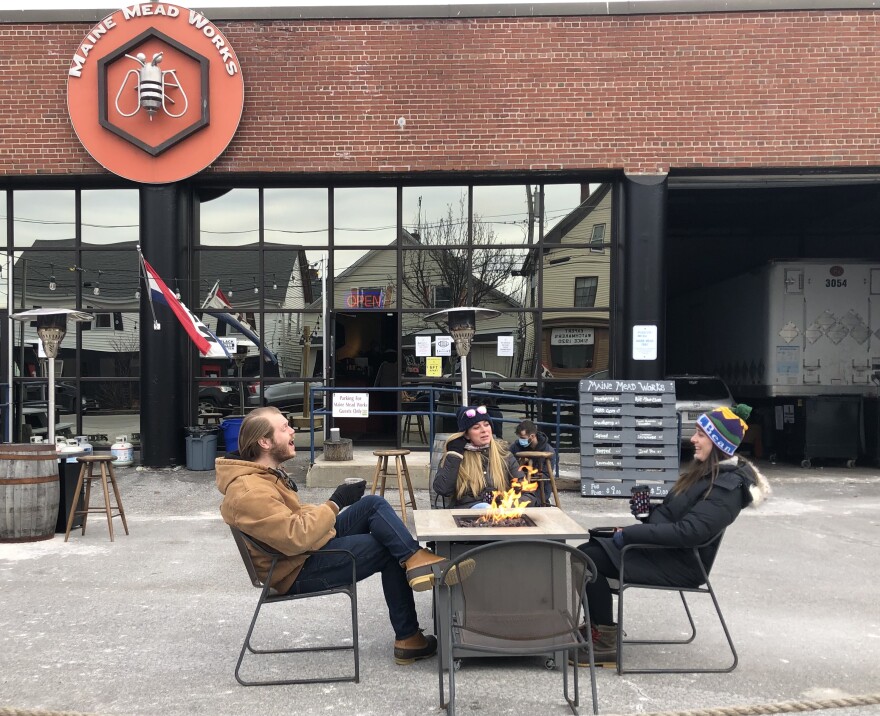The COVID-19 pandemic has hit Maine’s hospitality industry harder than any other sector. With cold weather taking its grip on 2021 and the surging virus keeping people at home, job losses are accelerating, particularly in the food-service sector. Still, many of Maine’s chefs and restaurant owners continue to find new ways to stay open through the winter.
“This was just a gravel courtyard, had no structure,” says Ian Malin, co-owner of Little Giant, part of the Portland restaurant scene that over the last decade vaulted the city into the ranks of national foodie destinations.
Last week, Malin and a crew were finishing out this semi-enclosed patio, laying heating ducts in the cement floor and topping the walls with high-power, marine-grade electric heaters.
“Combined 35,000 watts. So between the heaters and the floor eventually when I connect that we’ll have a pretty toasty area. It’s going to be a small restaurant, maybe 20 seats, but between this and takeout we hope to be able to hang on back to April,” he says.

State COVID-19 rules actually would allow Malin to seat diners indoors at half capacity. But as with many smaller venues in the state, Little Giant’s so far opted, for safety’s sake, for street-side tables and takeout menus.
As temperatures started dropping into the 30s, Malin says he began to think about how to invest some of the restaurant’s pandemic relief funds in a lasting way.
“And I said we could do something temporary just to get us through the winter and then that money is gone forever, or I could build something that not only allows us to get through COVID but also something that allows us to do something with this space in future winters, but also summertime,” he says.
The city of Portland has made grants up to $7,000 for small businesses looking to “winterize” their operations. And last month, the state Department of Community and Economic Development sent $53 million in new grants — paid for by the CARES Act — to hundreds of hospitality businesses in Maine.
Most were restaurants, and most of them landed the maximum grant of $36,000.
Among them was a Tex-Mex barbecue joint called Terlingua.
“It definitely feels safe, it feels fun and inviting,” says Eddie Moreau, who with dining companion Leah Pearl had a choice of distinctive outdoor seating areas in Terlingua’s terraced backyard, each with a different heating setup: picnic tables, a pair of semi-enclosed “fish shacks” or a multilevel series of bar-tops in an airy, canvas-walled space.
“They did a killer job with layout and design, they’re going to crush for sure,” Moreau says.
The couple’s made a pastime of visiting the breweries, distilleries, takeout windows and sit-down restaurants that crowd this three-block stretch at the base of the city’s Munjoy Hill.
All manner of outdoor enclosures and heaters are fostering a new kind of cold-weather social scene.
“Especially on a beautiful day like this. It’s also like better mindwise to get outside and get fresh air when you’ve been cooped up all year, it seems like. So it’s a nice area,” she says.

But there are new holes in the local scenery. An Asian noodle shop, Cong Tu Bot, is closed for a winter break, with reopening “TBD.” A nationally acclaimed restaurant called Drifter’s Wife has shut down for good. There have been cutbacks and closures all over the state.
“We have 28,000 workers unemployed in this industry right now. That’s a big chunk of Maine’s economy,” says Steve Hewins, executive director of the industry trade group, HospitalityMaine.
Hewins says a study by University of Maine economists estimates that in 2020, the state’s hospitality sector declined by more than 30% from the previous year, down to about 51,000 direct and indirect jobs.
“We knew this was coming. And what’s left are the people that are toughing it out. And they are doing what restaurant people do, which is innovate and adapt, and utilize what tools they have to try to generate the revenues to stay open,” he says.
And some who are toughing it out are even finding new ways to lend a hand. A dozen restaurants, from Portland’s Little Giant to Cafe Miranda in Rockland, have teamed up to provide meals for the hungry in a program called Cooking for Community. It’s fueled by donations from individuals, local food producers, and corporations such as the Hannaford grocery chain.
“Isn’t that insane?” says Cafe Miranda’s owner, Chef Kerry Altiero.
Altiero says as the program buys meals for those in need, it has helped him keep more staff at work through the winter, while doing some good for the community at large.
“And we get $10 a meal, right? So if we can do it for $5, we make $5 a meal, somebody gets a job, somebody gets fed. And what’s crazy though, is that Hannaford is paying us to buy food from somebody else to feed it to people that would maybe buy food from them,” he says.
Altiero says some of the jobs he’s had to eliminate may never come back. And even with the metal firepits he and staff fabricated to help outdoor diners stay warm, the restaurant’s wintertime prospects remain uncertain.
But he and others in the industry do believe that cold-weather, al fresco seating will persist in Maine, even after the pandemic.
At Terlingua, diners Pearl and Moreau say the experience reminds them of a wintertime visit to Quebec City.
“Pretty daunting for us at first, but now we kind of get it,” Pearl says.
“I think New Englanders are pretty durable people and they kind of adapt,” Moreau says.
“People are still wearing shorts outside, so, anything’s possible,” Pearl says with a laugh.


